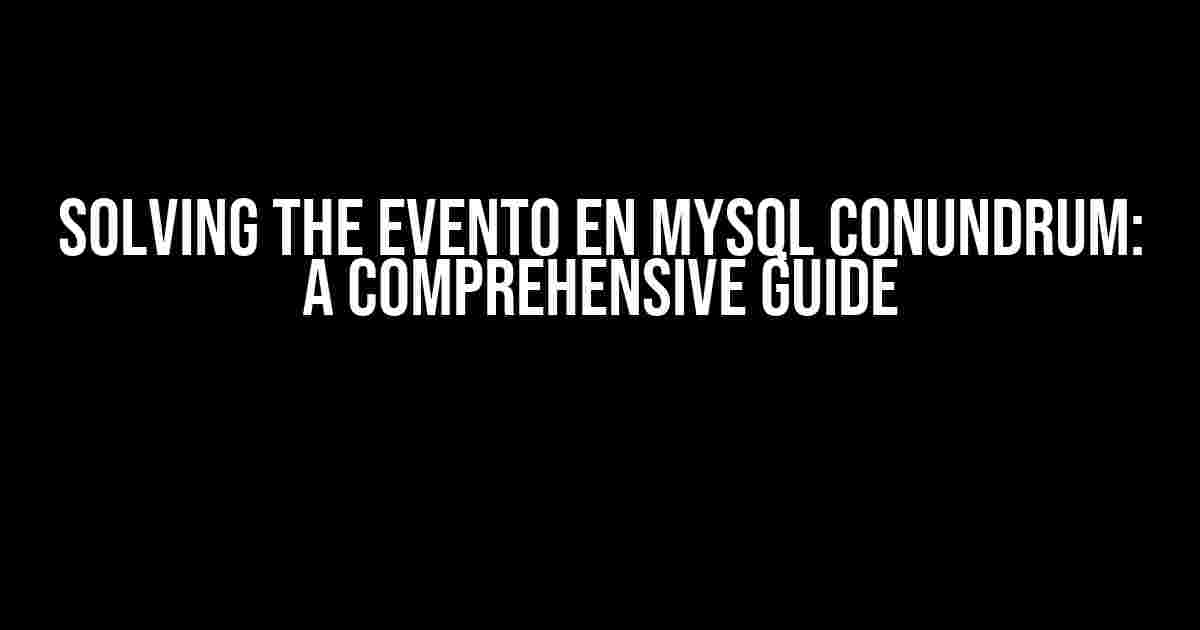When it comes to managing events in a MySQL database, developers often stumble upon the “Evento en Mysql” issue. This problem arises when trying to create an event that triggers certain actions within the database. In this article, we’ll delve into the world of evento en Mysql, exploring the causes, solutions, and best practices to overcome this common obstacle.
What is Evento en Mysql?
Evento en Mysql, which translates to “event in MySQL,” refers to a scheduled task that automates specific database operations. These events can be used to perform various functions, such as data backups, maintenance tasks, or even send notifications. However, when not properly configured, events can lead to performance issues, data inconsistencies, and even crashes.
Causes of Evento en Mysql Issues
Several factors can contribute to the Evento en Mysql problem, including:
- Incorrect event scheduling, leading to overlapping or conflicting tasks
- Insufficient privileges or access control, causing permission errors
- Inadequate database indexing, resulting in slow query performance
- Incorrect event definition, causing syntax errors or unexpected behavior
Solving Evento en Mysql Issues: Best Practices
To overcome the Evento en Mysql conundrum, follow these expert-recommended best practices:
-
Use the
CREATE EVENTstatement to define events, ensuring correct syntax and structure. -
Set the event schedule using the
ON SCHEDULEclause, specifying the correct interval and timing. -
Implement proper indexing to optimize query performance and reduce event execution time.
-
Use stored procedures to encapsulate event logic, improving code organization and reusability.
-
Test and validate events thoroughly, using tools like the MySQL Event Scheduler to monitor and debug.
-
Regularly review and maintain events to prevent conflicts, errors, and performance degradation.
Conclusion
In conclusion, the Evento en Mysql issue is a common obstacle that can be resolved by understanding the causes and applying best practices. By following the guidelines outlined in this article, developers can create efficient, reliable, and high-performing events in their MySQL databases. Remember to stay vigilant, monitor event performance, and adapt to changing requirements to ensure a seamless database operation.
Here is the HTML code with 5 Questions and Answers about “Evento en Mysql” in a creative voice and tone:
Frequently Asked Question
Unlock the power of MySQL events and take your database management to the next level!
What is an Event in MySQL?
A MySQL event is a set of scheduled tasks that run automatically at a specified time or interval, allowing you to perform maintenance tasks, automate repetitive actions, and implement complex logic without manual intervention.
How do I create an Event in MySQL?
To create an event in MySQL, use the CREATE EVENT statement, specifying the event name, schedule, and the SQL statement to be executed. For example: CREATE EVENT my_event ON SCHEDULE EVERY 1 DAY DO CALL my_procedure().
What are the benefits of using MySQL Events?
MySQL events offer several benefits, including automated maintenance, improved database performance, reduced administrative workload, and enhanced data integrity. They also allow for complex logic implementation and scalability.
Can I schedule an Event to run at a specific time?
Yes, you can schedule an event to run at a specific time using the AT keyword. For example: CREATE EVENT my_event ON SCHEDULE AT '2023-03-01 14:30:00' DO CALL my_procedure(). This event will run only once at the specified time.
How do I check if an Event is enabled or disabled in MySQL?
To check if an event is enabled or disabled, use the SHOW EVENTS statement with the WHERE clause. For example: SHOW EVENTS WHERE event_name = 'my_event' AND Status = 'ENABLED'. This will display the event status.
Let me know if you need any changes!

